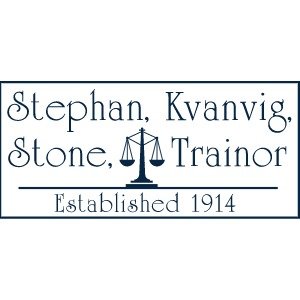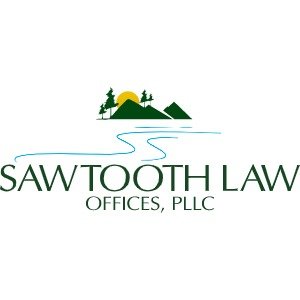Best Nonprofit & Charitable Organizations Lawyers in Twin Falls
Share your needs with us, get contacted by law firms.
Free. Takes 2 min.
List of the best lawyers in Twin Falls, United States
About Nonprofit & Charitable Organizations Law in Twin Falls, United States
Nonprofit and charitable organizations in Twin Falls, United States, operate within a legal framework that supports their mission-driven initiatives. These organizations are distinguished by their purpose, which typically focuses on educational, religious, scientific, and other charitable endeavors. In Twin Falls, as in other parts of the United States, nonprofits must comply with both federal and state regulations that govern their formation, management, and operations. Understanding these laws is crucial for successfully maintaining a nonprofit’s tax-exempt status and ensuring organizational compliance with legal requirements.
Why You May Need a Lawyer
Several situations may necessitate legal assistance in the nonprofit and charitable sector:
- Formation and Structuring: Establishing a nonprofit involves complex paperwork and understanding legal obligations. A lawyer can help draft necessary documents and ensure compliance with state and federal laws.
- Tax-Exempt Status: Securing and maintaining 501(c)(3) status is critical for tax exemptions. Legal guidance can simplify navigating IRS requirements and procedures.
- Governance and Compliance: Nonprofits require a robust governance structure. Attorneys can assist in drafting bylaws, policies, and procedures that align with legal standards.
- Employment Law: Understanding employment laws specific to nonprofit workers ensures compliance and avoids legal disputes.
- Contract Disputes: Nonprofits often engage in contracts for services and partnerships. Lawyers can help in negotiating and resolving any ensuing disputes.
Local Laws Overview
Twin Falls, as part of Idaho, requires that nonprofit organizations adhere to certain state-level regulations. Key aspects include the filing of Articles of Incorporation with the Idaho Secretary of State and adhering to the Idaho Code governing nonprofit businesses. Additionally, Twin Falls nonprofits must ensure they follow local business codes, paying attention to any specific municipal requirements related to charitable activities, fundraising, and solicitation. Compliance with both state-level and federal requirements is paramount, especially regarding financial reporting and tax obligations.
Frequently Asked Questions
What steps are necessary to establish a nonprofit in Twin Falls?
To establish a nonprofit in Twin Falls, you must file Articles of Incorporation with the Idaho Secretary of State, adopt bylaws, apply for an Employer Identification Number (EIN), and submit a 501(c)(3) application for federal tax-exemption. Consulting a lawyer to navigate these steps can ensure compliance with legal obligations.
How does a nonprofit maintain its tax-exempt status in Twin Falls?
Nonprofits must file annual 990 forms with the IRS, adhere to operational standards set forth in their bylaws, and comply with both state and federal regulations, which may include state-specific reporting and registration requirements.
Are board members of a nonprofit personally liable for the nonprofit’s debts?
Generally, board members are not personally liable for the debts of a nonprofit. However, they must fulfill their fiduciary duties to avoid liability for the organization's actions.
What are a nonprofit’s reporting obligations in Twin Falls?
Nonprofits must file annual reports with the Idaho Secretary of State and federal IRS forms. Depending on activities, additional financial and operational disclosures may be required.
Are nonprofit organizations required to pay sales tax in Twin Falls?
Nonprofits in Idaho are generally not exempt from sales tax, and must apply for exemption or ensure all applicable taxes are paid for purchased items used in their operations.
What constitutes illegal fundraising in Twin Falls?
Illegal fundraising includes soliciting donations without proper registration, deceptive practices, or not adhering to regulations governing charitable solicitations in Idaho. Legal counsel can help ensure compliance with fundraising laws.
How can a Twin Falls nonprofit board ensure compliance with fiduciary duties?
Board members should attend meetings, participate in oversight, understand the organization’s financial health, and consult legal experts when in doubt about their responsibilities.
Can nonprofits in Twin Falls lobby for legislation?
Yes, but there are restrictions on lobbying activities for 501(c)(3) organizations. They must abide by IRS guidelines and Idaho state law concerning lobbying activities.
Do Twin Falls nonprofits need to register as charities?
Yes, state regulations typically require registration with the Idaho Attorney General’s office for charitable solicitations to ensure transparency and legality of fundraising efforts.
Can a nonprofit in Twin Falls endorse political candidates?
No, 501(c)(3) organizations are prohibited from directly or indirectly participating in political campaigns on behalf of or against political candidates.
Additional Resources
For more information, these resources may be helpful:
- Idaho Secretary of State Office
- Idaho Nonprofit Center
- Internal Revenue Service (IRS)
- Idaho Attorney General Charitable Trusts and Solicitations Bureau
Next Steps
If you need legal assistance, consider reaching out to a lawyer who specializes in nonprofit law in Twin Falls. You may also consult with local nonprofit associations or legal aid services for initial guidance. Additionally, attending workshops or seminars related to nonprofit management could provide valuable insights and networking opportunities with legal experts and peers.
Lawzana helps you find the best lawyers and law firms in Twin Falls through a curated and pre-screened list of qualified legal professionals. Our platform offers rankings and detailed profiles of attorneys and law firms, allowing you to compare based on practice areas, including Nonprofit & Charitable Organizations, experience, and client feedback.
Each profile includes a description of the firm's areas of practice, client reviews, team members and partners, year of establishment, spoken languages, office locations, contact information, social media presence, and any published articles or resources. Most firms on our platform speak English and are experienced in both local and international legal matters.
Get a quote from top-rated law firms in Twin Falls, United States — quickly, securely, and without unnecessary hassle.
Disclaimer:
The information provided on this page is for general informational purposes only and does not constitute legal advice. While we strive to ensure the accuracy and relevance of the content, legal information may change over time, and interpretations of the law can vary. You should always consult with a qualified legal professional for advice specific to your situation.
We disclaim all liability for actions taken or not taken based on the content of this page. If you believe any information is incorrect or outdated, please contact us, and we will review and update it where appropriate.









